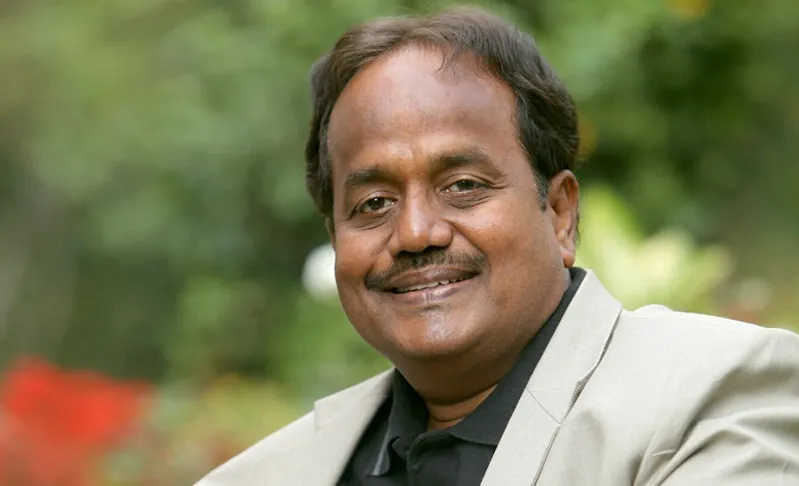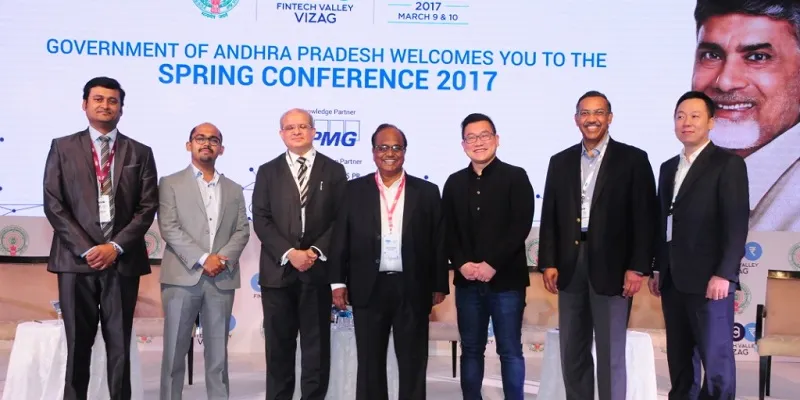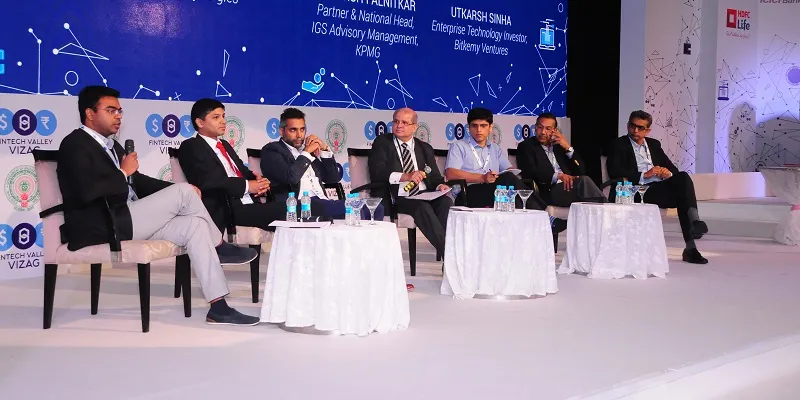Why the Andhra Pradesh government is betting big only on fintech
“Focus. Focus. Focus,” said a rather resolute JA Chowdary, Special Chief Secretary and IT Advisor to the Andhra Pradesh Chief Minister, on the first day of Fintech Spring Conference 2017, held in Vishakhapatnam.
The focus he talked about is one of the foundation stones of Andhra Pradesh’s new startup initiative, Fintech Valley Vizag.
The flagship initiative intends to bring together industry, academia, and investors to innovate, co-create, and build the fintech ecosystem, with the intent of making Visakhapatnam the fintech epicentre of the world. And the Government of Andhra Pradesh (GoAP) is leaving no stone unturned to make this a reality.

Advisory major KPMG has already signed up as the knowledge partner for Fintech Valley. Card network majors like Visa are helping the state government with infrastructure building for the project, while companies like Paytm, Transaction Analyst, GMS, and Knolskape have already started operating in the month-old fintech tower in Visakhapatnam.
The state government has also partnered with six educational institutions for imparting special courses on financial technology for necessary skill-building.
But at a time when neighbouring Telangana is charged up about its Hyderabad-based T-Hub, isn’t this move by Andhra Pradesh to focus on just financial technology short-sighted?
Apparently not. Chowdary, in an exclusive interaction with YourStory, enumerates the reasons for the same.
YS: So why is GoAP giving this special focus to only financial technology?
Chowdary: Well, considering that resources are limited, there needs to be a sharp focus in a particular area, otherwise one will never be able to create real impact through just noise. We studied the areas and identified the major ones which may create a real impact.
Ultimately, for any government, through economic activity, the key milestone is job creation. Especially with a population of 1.2 billion, it becomes even more fundamental for governments to focus on jobs.
Now, with Indian IT 1.0 slowing down with automation and layoffs, we mapped sectors that are going to be crucial to creating the right jobs for our people.
We narrowed it down to three technologies — cyber security; blockchain, which is just emerging and key to preventing cyberhacks; as well as analytics, considering the digital footprint the country has been creating.
We thought of focusing on one industry where all these technology changes are relevant. Fintech encapsulates all three and, as an industry, is growing globally at a CAGR of 26 percent.
However, you will also see that these technologies have a horizontal impact cutting across most sectors, and don’t just see an application in financial technology.
YS: Don’t you think branding it as Fintech Valley will discourage startups from other sectors from engaging with the initiative?
Chowdary: These days, it is difficult to succeed unless you have a focus. If I say we are going to do A-Z here, the industry finds it hard to believe. For example, just two months ago, we said we were going to host this (Fintech Spring Valley) conference and more than 150 global companies participated in the startup challenges thrown by different financial institutions.
But because we had a strong focus on fintech that many of them travelled from the UK, Japan, Singapore, and Switzerland to participate in a conference which wasn’t much advertised. Forty percent of the startups participating in today’s challenges are from outside the country.
We have also decided to create the largest repository of use cases (either for banks, regulators, or government) in the world because while businesses can still get funding, where will they deploy their solutions or get a market for the technologies they’re building?
Hence, this market access is nothing but the use cases which companies like Bharti AXA, HDFC Bank, ICICI Lombard, Angel Broking, and ICICI Bank have put forward for startups in Fintech Valley Vizag.
YS: This use case repository as a strategy seems to be your differentiator. Can you tell us about it?
Chowdary: We have roped in KPMG as a knowledge partner, which went to different banks to understand their pain points and derived use cases out of them.
Banks will also feel benefited that they are getting to engage with the real startups through just this collaboration.
So we are asking startups globally to pick up one use case from this repository, build the solution here, and as Fintech Valley Vizag, we will give you $1 million worth of business and access to market, through a proof of concept (POC). We call it the ‘$1 million global fintech award challenge’.
YS: But the regulators and big financial institutions are in Mumbai, Maharashtra. How do you plan to take the attention from there?
Chowdary: See, banking is a small part of fintech. And how does it matter, when the entire world is working on telecommunications with their customer being as far as 10,000 miles away? And Mumbai is even closer. The pace at which technology is running, people are sitting in their homes and running companies.
YS: What are your views on your neighbouring state of Telangana, creating noise about its startup initiatives and T-Hub?
Chowdary: What all of us are trying to do is create our unique USPs, and I want to focus on creating ours.

How do they plan to do it?
Chowdary took us through how the state government wants to close in on their vision of putting Visakhapatnam on the global map.
He said, “Our aim is to create a culture like Silicon Valley, where we will be hosting events and VCs will be coming, use case providers will be giving presentations. Otherwise, it will be very difficult for these startups to approach customers. Rather than calling for these startups, we want to create an ecosystem which attracts them.”
Further, the government is even partnering with universities to create unique fintech courses to address the base skill set.
(These include GITAM University, Noble Institute of Technology, Anantha Lakshmi Institute of Technology and Sciences, Lankapalli Bullayya College, Gayatri Vidya Parishad, and PVKK Institute of Technology)
At present, the Fintech Valley initiative has close to 50 individual mentors, with the government signing four MoUs with investors, and nine in total, on Thursday.
These included with learning company Pearson for developing financial technology curriculums; Paradigm IT for knowledge sharing and insights; LATTICE80 for joint fintech programmes; HackerEarth for creating the necessary developer ecosystem; F6S for investments and market access; Zone Startups for acceleration; and investors Anthill, Hyderabad Angels, and Forum Synergies for investments.

Fintech Valley has also tied up with Singapore’s central bank and financial regulatory body, Monetary Authority of Singapore.
Every quarter, the Fintech Valley plans to host an event to attract newer startups, which takes the count to four domestic events, along with two additional conferences of international stature.
As of now, having onboarded five startups, Chowdary thinks they should have a total of 12 by the end of the month. He said,
We are hoping to get 50 startups by the end of this year and our major investments are going into organising such meetups and roadshows while holding business plan competitions at fintech hubs across the world. Our aim is to create a Rs 400–500 crore Fintech Valley fund by October this year and have already closed Rs 100 crore for the same.
But while Chowdary talked about use cases for larger financial institutions, how does he plan to remove the characteristic friction which sometimes arises between the contrary functionalities of a nimble, fast-moving startup and a robust bank?
Simply put, banks need the government as much as startups need banks. And this is exactly why the government is getting involved and AP’s Chief Minister is quite kicked about making Fintech Valley a big success.
In an hour-long video conference, Chandrababu Naidu, Chief Minister of Andhra Pradesh, listed various reasons for choosing fintech as a focus segment,
We earlier went after IT when not many did. Today everyone is going after fintech and rightly so, because we have technologies like Aadhaar, UPI, and biometrics which are unique propositions to India, bolstering growth in financial services. My vision and ambition is to make Visakhapatnam the global hub for fintech. I’ll be your marketing manager, your brand ambassador, and the matchmaker between banks and customers.
And if industry members associated with this initiative are to be believed, the Chief Minister’s interest towards the Fintech Valley vision is only increasing.

So, will they make it?
Apart from being the COO of Bharti AXA, Latha Ayyar, who’s a special representative for IT & Innovation, Andhra Pradesh government, said,
“Financial institutions will have to set up their innovation labs somewhere. And if you make it lucrative for financial institutions to set up their innovation labs in Vizag by figuring out the supply side and making it worth their while by creating the right ecosystem, talent, and infrastructure, it will happen.”
About the time frame for this change, she clarified,
We have come a long way since we started in 2016. So in a year I have seen huge progress and can only see it leapfrogging. There is a visionary CM who is throwing his weight to make this happen and already has five major financial institutions onboarded. Seeing this, we can say that the ecosystem will be ready in the next three years, by 2019.
On the other end, Sampath Iyengar, General Partner, Forum Synergies, who just signed an MoU for the initiative, told YourStory,
The necessary change is the transmission of intent, basically execution, and this Chief Minister has a great track record of getting things done. But we have to set tangible milestones and need to understand ways how we can build this ecosystem in a tangible manner. However, my first understanding of this initiative is that it is a good start to the vision and there is a strong focus to this. Especially when we see institutional building has started with the offices of bureaucracies or government aligned together to this vision.
Altogether, the hoopla surrounding Fintech Valley Vizag seems to have caught the much-required attention of the financial industry stalwarts.
However, it all boils down to, as Sampath puts it, the real execution.
After all, even the Central government had made lofty claims about the Startup India initiative in 2016, with the promises and corpus of funds having had no real impact on the startup ecosystem.







